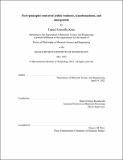First-principles control of zeolite synthesis, transformations, and intergrowth
Author(s)
Schwalbe Koda, Daniel
DownloadThesis PDF (38.43Mb)
Advisor
Gómez-Bombarelli, Rafael
Terms of use
Metadata
Show full item recordAbstract
Designing new materials enabling of sustainable catalysis and separations is essential to fully decarbonize the industrial sector, but materials discovery is hindered by labor-intensive experimentation. Computational methods such as high-throughput screening or machine learning can filter structures and compositions prior to experiments. Nevertheless, finding synthesis routes to realize computationally proposed materials still relies on trial-and-error. This thesis describes how materials discovery can be streamlined using high-throughput simulations, physics-based representations, and machine learning. In particular, this work analyzes the synthesis, phase transformations, and intergrowth of zeolites, which are industrially relevant catalysts and molecular sieves known for their hard-to-control phase competition and polymorphism.
Part I of this thesis describes the development of methods to simulate and analyze zeolite transformations and template-based synthesis. Diffusionless phase transformations and intergrowths are predicted by using graph-based representations of zeolite frameworks. Moreover, a data-driven analysis indicates how structural factors are often insufficient to predict outcomes in their synthesis. To address this knowledge gap, computational tools are developed to simulate template-based synthesis conditions for zeolites. The proposed methods accelerate the prediction of binding energies between molecular templates and zeolite hosts, reducing computational costs by up to two orders of magnitude while increasing the reproducibility of the calculations. These tools are then used to simulate hundreds of thousands of template-zeolite pairs in a high-throughput screening pipeline. The simulation results explain thousands of synthesis outcomes from the zeolite literature from the past six decades and recall archetypical templates purely from physical principles.
Part II of this thesis leverages these methods to design new zeolite synthesis routes, thus enabling the control of phase competition, intergrowth, and catalytic properties of the materials. The computational tools guide the experimental synthesis of zeolites with improved catalytic behavior, including pure-phase frameworks with low-cost templates and disordered structures with tunable polymorph selectivity. Finally, the computational approach maps numerous possibilities for further discovery based on over 35 million data points generated using machine learning, which is used to decode this “zeolite genome”. This work provides a roadmap on how synthesis routes for zeolites can be controlled a priori using theory and computation.
Date issued
2022-05Department
Massachusetts Institute of Technology. Department of Materials Science and EngineeringPublisher
Massachusetts Institute of Technology